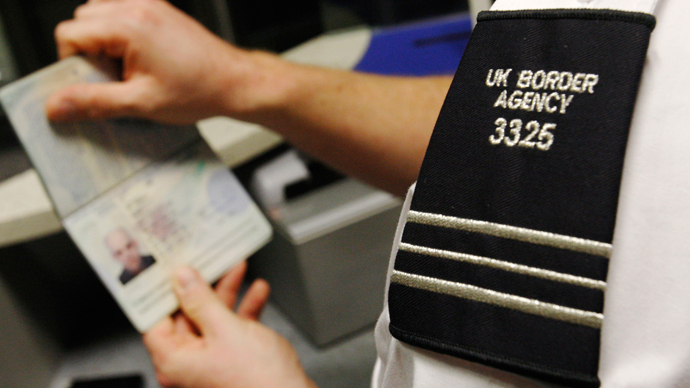Britain has scrapped a plan to force people from India, Pakistan, and some African countries to hand over a cash deposit in return for a six-month visa, after the policy caused outrage at home and abroad and exposed a divide in the governing coalition.
The government’s plan involved visitors from Ghana, Nigeria, Pakistan, Bangladesh, India, and Sri Lanka being forced to pay a £3,000 (US$4,800) deposit in order to receive a visa. The money would be refunded when the person left the country upon expiration of their visa. The plan was intended to serve as a deterrent to overstaying.
A government spokesman said Sunday that the pilot scheme - which was due to start next month -has been canceled.
“We have decided not to proceed,” a spokesman said Sunday without elaborating.
The government chose the specific countries because they are viewed as ‘high risk’ in terms of illegal immigration. In India, the scheme caused widespread public anger and prompted talks of retaliatory measures.
There have also been deep rifts within the governing coalition surrounding the policy, which was backed by the Conservative Party. The party has historically taken a tougher stance on immigration than their junior partner, the centre-left Liberal Democrats.
Lib Dem leader Nick Clegg initially said that he thought the plan was worth trying out - but changed his mind after some members of his party called it discriminatory.
As the country’s 2015 general election looms, Prime Minster David Cameron is keen to show voters that he is taking a tough stance on immigration.
Another controversial immigration policy was ditched a few weeks ago after some politicians and members of the public claimed it was racist.

The pilot scheme of nationwide advertising vans bearing the slogan “Go home or face arrest” was dropped in October.
But for voters, immigration remains one of the most important issues facing Britain. Fears have been ignited by reports in the right-wing press of “hoards” of Romanians and Bulgarians flocking to the UK once the European Union’s temporary restriction on migration and employment expires at the end of the year.
The UK Independence Party (UKIP), which is campaigning for Britain to leave the EU and halt mass immigration, made considerable gains in local elections last May. Cameron is concerned that his Conservative Party may lose votes to the party. The UKIP has the support of around 10 percent of the electorate, according to recent opinion polls.
The opposition Labour Party, which is currently ahead of the Tories in opinion polls, has said that Cameron’s immigration policy is in tatters. They point to the fact that the government has failed to significantly curb illegal immigration into Britain while at the same time alienating countries like India. The government has been at pains to entice countries like India and China to invest in the cash-strapped UK.
“It seems David Cameron’s government can’t get anything right when it comes to dealing with illegal immigration. Investors in India are now put off from investing in the UK, whilst the Home Office fail repeatedly to do anything about their failure at our borders to stop and return illegal immigrants,” Labour Party spokesman David Hanson said in a statement.
The government, though, insists that its drive to curb net immigration is on track. It’s planning a number of changes to immigration laws, which include increasing fines for employers hiring illegal immigrants, forcing landlords to check their tenants’ immigration papers, and making it harder for illegal immigrants to open bank accounts or get driving licenses.

